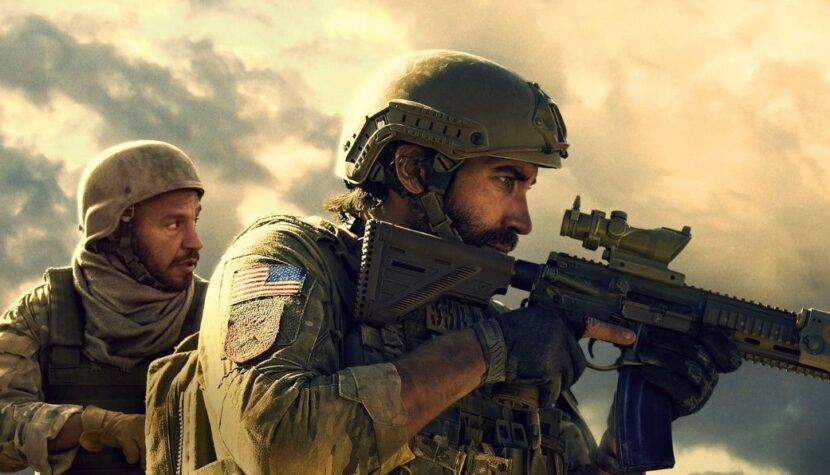GUY RITCHIE’S THE COVENANT. American Debt [REVIEW]

John Kinley (Jake Gyllenhaal) is not one of the most likable individuals in his unit. Rough, ambitious, matter-of-fact, he strongly dislikes it when anyone has a differing opinion from his. With the new translator Ahmed (Dar Salim), he faces a challenging ordeal – Ahmed has the audacity to question his orders and do things his own way. And even though it often turns out that the local Afghan resident understands the situation better than the American, Kinley remains unyielding. He doesn’t look at Ahmed with a friendly eye. However, the fates of these two men become intertwined. During a poorly coordinated mission, the translator saves his commander’s life. Consequently, the American incurs a metaphorical debt to the Afghan. And as it goes with debts – sooner or later, the hero will have to repay it.
With a distinct hand gesture, Ritchie divides his film into two parts. The division is marked by Kinley’s out-of-frame return to the United States, while the interlude involves the daring attempts to secure a visa for Ahmed and his immediate family. However, the main action unfolds in the Middle East. From the perspective of a foreigner, Ritchie touches upon a very recent part of American history. The United States only withdrew its troops from Afghanistan in 2021 – after a 20-year-long and, to put it frankly, lost war. The Taliban disregarded the signed agreement and immediately after the evacuation of American forces, they took control of almost the entire country. The Afghan people, who believed in the peace mission of soldiers from across the ocean, suffered the most – they were captured, tried for treason, and ruthlessly killed. Among them were Afghan-American translators like Ahmed.

The first few minutes of Guy Ritchies’ The Covenant are a true war drama, with a collective hero in the form of an American unit. Names and military ranks fill the screen. Nicknames and faces covered by helmets. However, it’s better not to get too attached to individual heroes. Ritchie’s genre twist transforms the war drama into a survival film – with Ahmed taking on the role of transporting the wounded commander. At this point, “Alliance” encounters a rather serious hiccup. Ritchie packs the pivotal event essential to the plot into a montage sequence: spectacular, yet too eclectic. This sense of unevenness is amplified in the second part of the film, where Kinley returns to Afghanistan to evacuate Ahmed and his family. Gyllenhaal’s character quietly transforms from a regular soldier into an American version of James Bond: a killing machine operating undercover in enemy territory. The sense of realism established in the first few minutes dissipates in the hot Afghan air. What remains is solid, albeit occasionally showy (I plead guilty to the excessive use of slow motion and drone shots), action cinema.
Related:
Conscience of the United States
Guy Ritchies’ The Covenant is at its best when it abandons spectacular shootouts in favor of the relationship between an American soldier and an Afghan translator. The bond between the characters is formed involuntarily – it’s based more on mutual respect than on sympathy. Ahmed doesn’t save Kinley because of friendship. Conscience plays a crucial role here, a set of internal principles – a different choice would not be in line with his code of conduct. Conscience and principles also determine the subsequent behavior of the American: the character cannot sleep a wink after returning to the United States. But not because he’s experiencing trauma from the brutal deaths of his unit mates. Kinley’s peace is disturbed by the injustice that befell Ahmed due to his heroic act. Perhaps it’s also uncertainty: would he muster a similar act of courage in the reverse situation? The character’s choice is thus illusory – he must leave his family and return to Afghanistan; he must repay the debt he incurred. To do what the United States, in reality, didn’t do – leaving local collaborators at the mercy of the Taliban.

The evolution of Guy Ritchie’s career is a puzzle that would challenge even Sherlock Holmes himself. The British director started with unpretentious gangster comedies, transitioned through a phase of studio blockbusters, and now puts his name to serious war cinema. In the meantime, he managed to create oddities like Swept Away, though in this case, extraneous factors played a major role. Ultimately, it seems that the author of Snatch simply doesn’t like to stay put – he needs to experiment, try himself in different genres and production conditions. He consistently transforms action cinema through all possible cases, yet every few years he feels the need to return to his roots – hence titles like The Gentlemen or Operation Fortune. With British rogues in the lead roles – heck, he even turned King Arthur into the leader of London’s underworld at one point.
Guy Ritchies’ The Covenant is definitely the most serious entry in his filmography. Somewhat reconciliatory, tackling a real, hot socio-political issue – yet still deeply immersed in the aesthetics of action cinema. A cognitive dissonance is guaranteed. Granted, Ritchie had shed the mask of a cheeky Brit before and attempted to make films with a stone-faced approach – resulting in the excellent Wrath of Man for instance. Harsh revenge cinema devoid of social contexts. In “Alliance,” the Brit tried on entirely new shoes: the same ones abandoned years ago (even before his fateful visit to Putin) by Oliver Stone. It turns out they don’t fit quite perfectly. Oh well – maybe the next pair will be a good fit.



